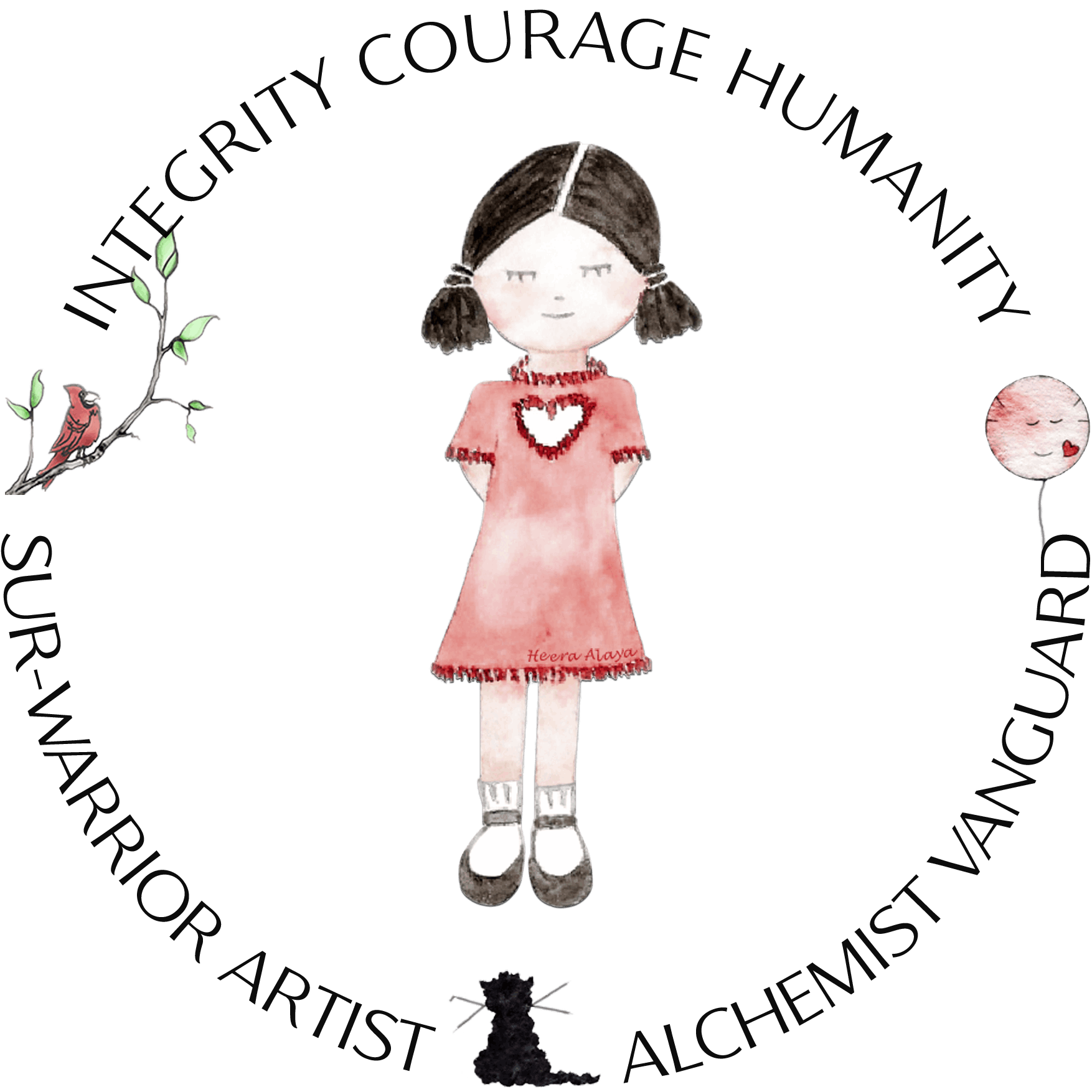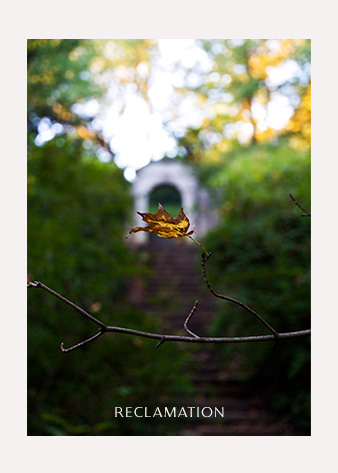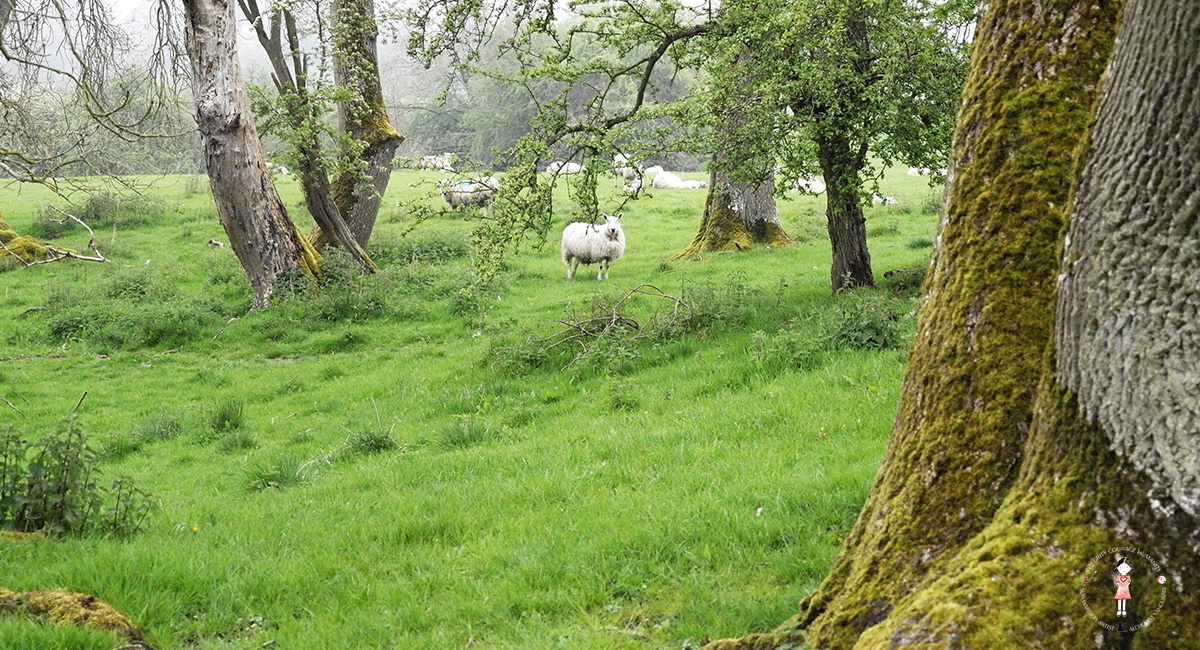
LUXURIOUS-FLUFFY GREEN SOCKS!
The mist shrouding the lush woodlands lifts softly, revealing bountiful forms and textures encircling tree stumps. Silvery-cream strands of luxurious wool—highlighted by filtering sunlight—hug moist green clumps. “All snuggly and sparkly,” I tease the trees, ambling past leaping, head-butting, bleating lambs. “The sheep must patiently weave their sturdy locks onto lucky you. From now on, I will call you Greenie Locks and the sheep,” I declare, tickled pink at my twist on Goldilocks.
I saunter on the woody paths towards the hidden pool of bluebells, expressing aloud, “The fluffy wraps must give trees an additional layer of insulation. How I wish the sheep–”
“What do you wish from us?” A hearty British longwool springs up on me.
The ewe wears a neutral expression (so do her ears), not giving away her emotions. Did I enter her boundaries, or does she want a direct answer?
“Why, hello there!” I greet, a tad apprehensive.
The large-framed ewe steps closer with questioning eyes.
Don’t babble; be direct, I instruct myself. “The fluffy wraps you knit over trees appear warm and cosy. I wished you’d make me one, too.”
“For starters, it’s moss and not woolly locks. The wind and water disperse spores, ensuring growth on damp surfaces. And thanks to all the water absorption and retention, these beautiful green tufts set up moss homes on stumps,” the ewe stated matter of factly.
“Fascinating.”
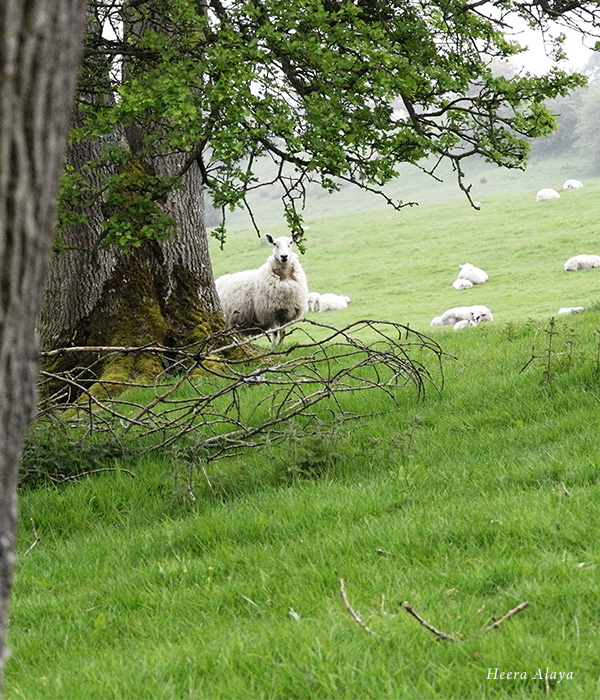
“And it’s not all hunky-dory.”
“No?”
“The snug moss blanket can be heavy on trees.”
“What do you mean?”
Inching closer to the velvety tree stumps: “The moss profusion you see here can stress trees, especially in shady, low-air-circulation areas.” The ewe offers a simple illustration: “Imagine your feet in soggy socks laced tight into soaking shoes, and that too for an extended period. Besides becoming prune-like, the water will weigh down your feet.”
Clutching a lustrous tuft of sheep hair, ”How did your locks fasten onto the moss?”
“By doing what sheep do—rubbing against trees to shed winter wool, get light, and spring forward.”
“That explains.”
“We rub to mark territory, too,” the ewe whispers, stretching her peaceful face closer to me.
I nod, keeping it under wraps.
“I see you have handsome company today.“
Hmmm, the ewe is familiar with my routine. Glancing at the figures descending the slope, “Walking alone, quietly, is one of my prized luxuries. Once in a blue moon (when my generosity is peaking), I accommodate aligned company.”
“Embrace the woodland, inhale the earth, be garlanded by wildflowers—it’s the way to nourish your soul,” encouraged the ewe knowingly. “I must be on my way.” The ewe started walking only to turn around: “About the warm scarf—“
“What about it?”
“Have you considered knitting?”
“Oh, that would be ambitious. I have butterfingers.”
“C’mon, how would you know if you don’t try?” coaxed the ewe.
“You are right.”
“We could teach you to knit.”
Taken with the ewe’s generosity: “Thank you; that would be darling.”
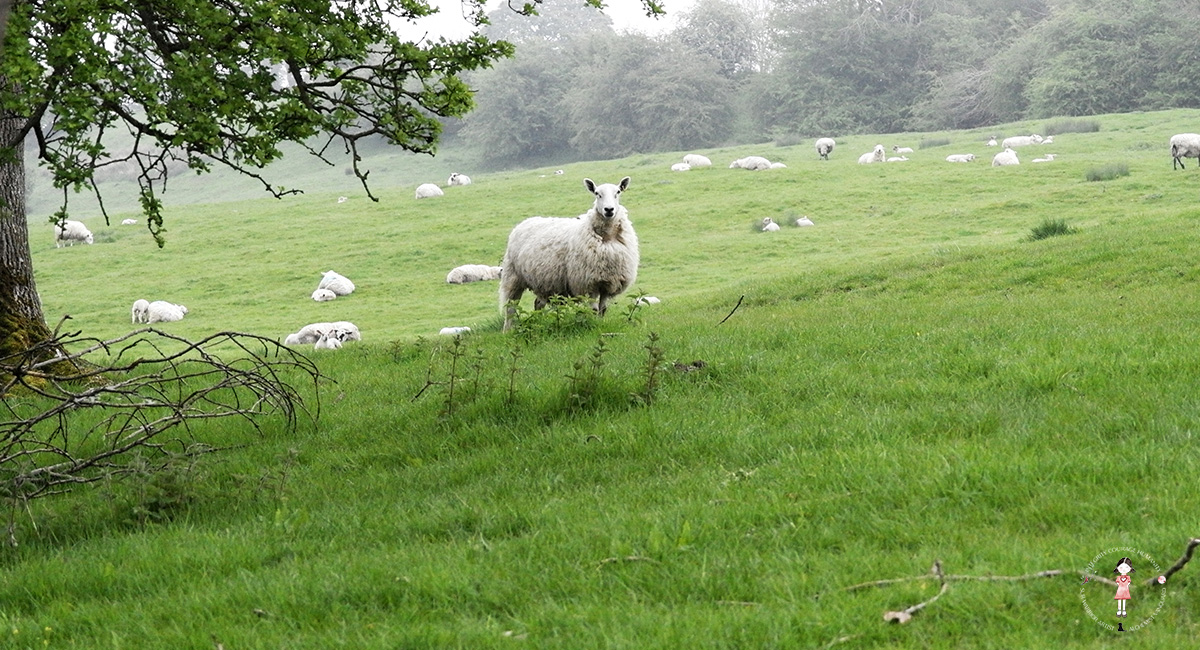
“Do you prefer misty-windy mornings like today or drizzly-windy ones like yesterday that got you … somewhat dishevelled?”
The ewe’s curling stiff upper lip displays British politeness.
PREGNANT PAUSE.
I aim to disrupt the English propahness. Head tilted, eyebrows raised, I convey: You all laughed heartily at klutzy me, didn’t you?
The ewe continued to peer at me, her mind flooding with recollections of a shivering, soaked, slushy body barreling down the slippery hill. Despite attempts to control her emotions, the ewe’s platinum-coiled locks couldn’t keep up with British decorum—with the slightest titter, her curly locks sprung back and forth.
I couldn’t hold it any longer, either. Uncontrollably laughing, “So much for my happy heel clicking. The not-so-soft landing on fresh dung sent me crashing, taking every weed and bush in the way!!”
“HE-AA-AA. HE-AA-AA. HE-AA-AA.” Formality damned, the floodgates had burst, unleashing the ewe’s inner cackling goose. “Seeing your clumsy body flying past us was the perfect treat for a gloomy, soggy day.”
“Missing were Darjeeling tea, fruit scones and clotted cream,” I goof, bending further in laughter.
“HE-AA-AA. HE-AA-AA. HE-AA-AA.”
Uncurving from fits of laughter, “Resisting the lushness is not my forte, so rain-soaked, dung-coated or wind-beaten, I plod along. And into the forest I go to lose my mind—”
“and find my soul.” The ewe completed Muir’s sentiments, her belly still jiggling with bobbing curls.
Seeing me impressed, “Only a good old Scot can sum up profoundness with simplicity. And you, my dear, on finding your soul with mud, grass and all that gunk, could have passed off as one of us, sheep!”
“I will take the compliment. Circling back to the weather, I prefer cool, crisp and misty.”
“We will put in an order. Any sides, Madam?” The ewe teased.
“Generous flashes of sunshine.”
“Noted.”
“Thank you.”
“I will set aside wool, my dear. Glancing over at a ewe and her lamb by the Glastonbury thorn, “My friend, Willow (Her lamb, Petunia, is precious.), can guide you on gentler ways to colour wool.”
“I can’t wait.” It’s telling how a term of endearment from a ewe, thanks to the underlying sincerity, feels right, but from a human whose intention is to trivialise and control, is patronising.
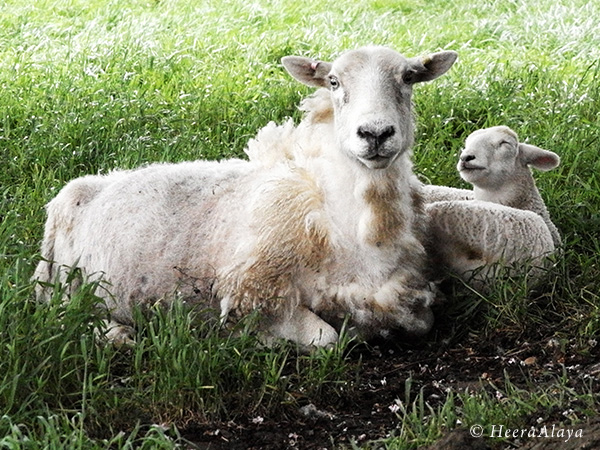
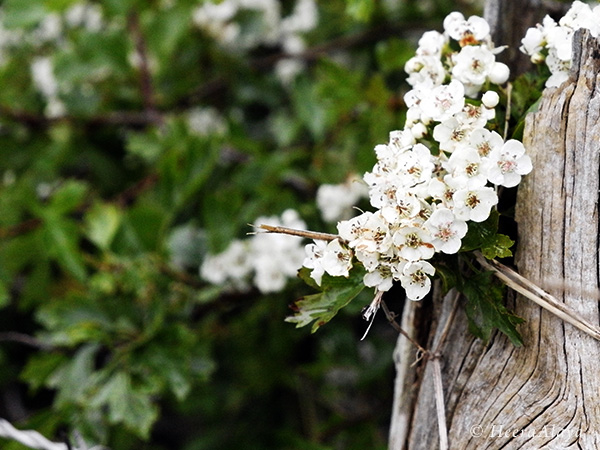
“And where do I find you on our knitting date?”
“Around here or over the hill. If you don’t see me, call out: Honey Crisp.”
Reading my expression, “Not the apple variety you are thinking about. My gran named me Honey, which became Hun, and eventually upgraded to Honey Crisp.”
“Upgrade?”
“True to my name, Honey, I was sweet to everyone, but I got bullied and beat up in the bargain. One fine day—and it was a royal sunny day as though the sun came with gusto to strengthen my resolve, I said ENOUGH.”
“I love feisty; go on.”
“Crisp, my alter ego, was born (with pomp and show and what a show it was!) to balance my innate softness. A snort does the work; however, now and then, a weak weasel begs to be pummelled, and being benevolent, I oblige—a mighty kick wakes up the ram wimps as it does ewe wuss’s.” Honey Crisp let out a booming guffaw, kicking tufts of grass so high, I dread thinking about the weak bullies hurled to oblivion.
”We are in the same boat. I am called Bee.”
“Oh, the S…T…I…N…G…E…R. Welcome to the baddie babe brigade.”
[Thunderous laughter]

EUDAIMONIA
amalgamations and elucidations
By Heera Alaya
Aperire 1st, 2025
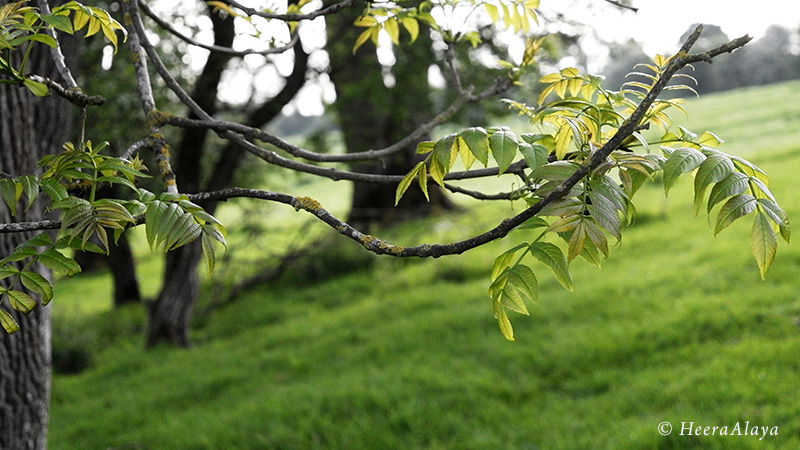
“I need solitude. I need space. I need air.
I need the empty fields round me; and my legs pounding along roads;
and sleep; and animal existence.”
VIRGINIA WOOLF
English writer
Catching shimmering bright leaves on the lush spring trails, I try guessing the shades of leafy green: “It could be the aromatic, vibrant mint green herb that makes a spicy chutney or is it more like the “l’heure verte” that I stepped into in Marais, wanting to get a taste of Van Gogh and Hemingway’s Absinthe (Forget putting down an alphabet or a stroke, a couple of Absinthe sips will ensure a stumble and tumble into the Seine.).
The deeper I go into the woods, the darker the appearance of the leafy foliage, which keeps me guessing aloud: “It has to be close to the darkening skin of avocado (It’s a pity the yummy, buttery flesh oxidises quickly.), or maybe it’s tilting toward the Latin viridis (green that naturally forms on copper and bronze when exposed to water, sulphur and oxygen); I love its bewitching blue-green patina.”
I move past low branches and through sun-dappled canopies, admiring the roof-like structures. My mind constantly sifts through the switching shades: “Could that be jade green? Or does it appear like emerald green? It’s likely closer to olive green! Mmm, perhaps it’s sea green. Nah, it’s got the tartness of apple green. Nope, more like earthy, wild sage. It has to be pistachio green. I am veering toward meditative thyme.
Smoked green.
Dirty seaweed.
Bluey Pine.
Bottle green.
Muted moor.
Basil.
Eucalyptus.”
Djokovic and Federer are on fire.
WOOSH.
Osaka is having none of the loud chatter; bursting in, she smashes forceful winds: “Deuce.”
A gust of wind scoops me off the ground. Arms waving, I shout: “Give me green; give me all shades of nature’s palette.”
SNAP. CRACKLE. THUD.
I land on a branch of a stout tree. My attempts to hold on for dear life prove futile—the wetness and dripping leaves ensure I slide, taking loose branches and debris with me.
My attempts to get up are far from successful, let alone elegant. With my arms folded, legs spread and face tucked in (with open eyes), I must appear like a disoriented, clumsy moss frog in cataleptic sleep. I might as well croak!
I decide to stay put till the winds blow by. My ear remains plastered to the gnarly old stump.
WHAT? WHO?
I feel a flickering movement and hear imperceptible creaking. “Should we bloom this coming spring or a couple of springs later?”
Holy Smokes! I squeeze my eyes and press my ear closer. The roots? Do I hear the roots conversing?
Taking a moment, an adjoining anchoring root offers: “Let’s skip a year (of blooming).”
“I second you,” interjects another tree root. “The wild animals polish off every morsel of beechnuts and acorns, leaving no seeds to turn into seedlings.”
A concerned young tree root chips in, ”The bee population will dwindle. How do we pollinate?”
“No different from ash tree samaras—wind-pollinate. We can trust the glorious wind, who, unlike the bees that will huddle in their apiaries, arrive even with dropping temperatures.”
The communication is brief and to the point.
Time to get up, I convince myself, satiated with eavesdropping on trees chatting through their interconnected root systems.
ARRG.
Attempts to uncross my legs are proving to be a feat. “Ow. Ow. Owwww.” My downturned palms wear scratches from pokey weeds. I steady myself, grunting and clinging to an overflowing, profusely leafy branch, almost sweeping the tall grass.
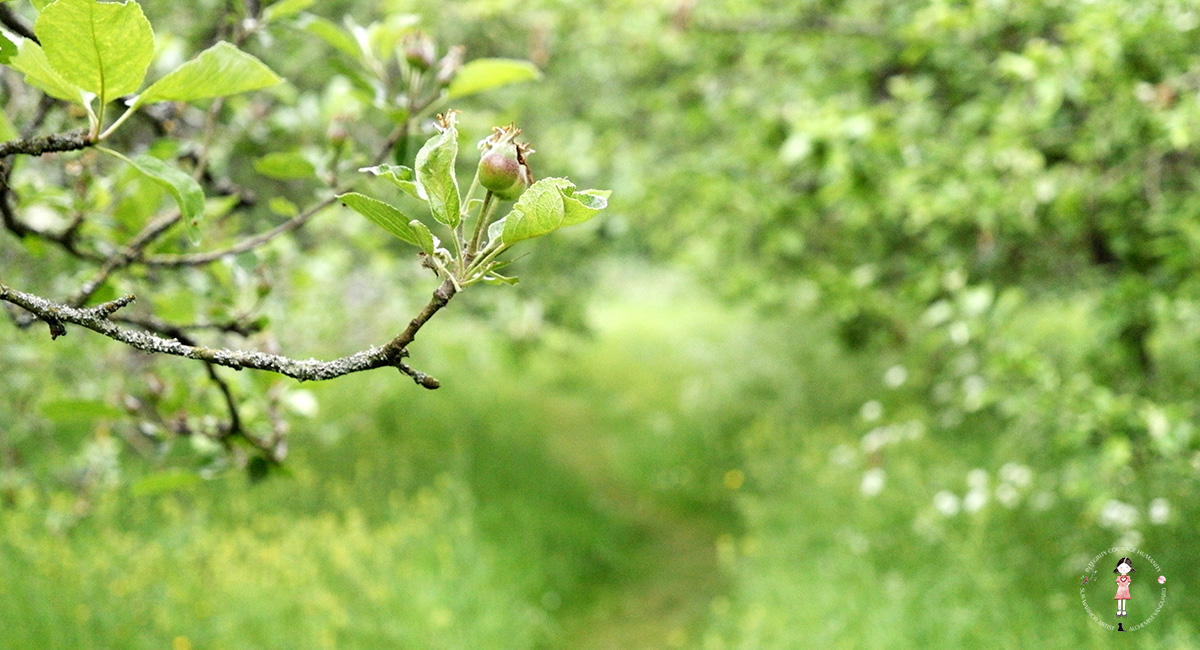
Whirrrrrrrrr.
Huh! It’s not my breath; it’s not my heartbeat. It’s muffled murmuring.
“The ‘all shades of green’ she desires is thanks to us—chlorophyll; we are the green-coloured, primary pigment giving all green plants their colour from spring through summer.”
Wait a minute. The leaves are talking about me. So, they have been eavesdropping, too?
Pretending not to hear but wanting to listen to it all, I tilt my nest-looking head complete with twigs, moss and ferns. Eavesdrop, woman, you never know what you will learn.
“Wonder if she knows that the first leaves in spring—with young leaflets’ chloroplasts—are much lighter and brighter in colour than summer ones?”
My heart goes bumpity boom.
“What about the progressive saturation?”
My, my; this exchange is getting technical.
“She will be surprised to learn that as the leaves mature, they make additional pigments, turning the layers darker green?”
The communication is brief and to the point.
I amble along, saturated with learnings.
The air is brimming with myriad invigorating aromas—sweet, delicate wildflowers, resinous, gushing streams, and woody, damp trees, all of which I adore. However, as a pluviophile, the post-rain earthy smell—petrichor—brings me to a halt. In an attempt to store the distinctive heady scent of the earth, I close my eyes, inhaling nosefuls, directing the exhilarating aroma to mystery chambers in my body: “Ah, we meet again; you know where to go. It’s a delight to have you; please make your way to the upper left chamber. Welcome; you can head to the top. Come on in; it’s straight down to the right. Settle in. Make yourself at home.” The refreshing petrichor is all checked in and ready to retrieve sparingly as and when my heart desires.
Rain does to nature’s aromas what meadows do to landscapes. The rich tapestry weaves a textural contrast of short and tall grass with a generous sprinkling of colour-filled wildflowers—from cheerful, decadent daffodils to flat buttercups. Daffodils, perennial spring-flowering bulbous, like moss, are not favoured by bees. Meanwhile, with their open flowers, buttercups from the ‘little frog’ family make it popular for certain bees. Self-seeding forget-me-nots—early spring flowers—are popular (and pretty) additions to meadows, as is the red campion—favoured by butterflies, bumblebees and bees—that pick up the baton as bluebells call it a day.
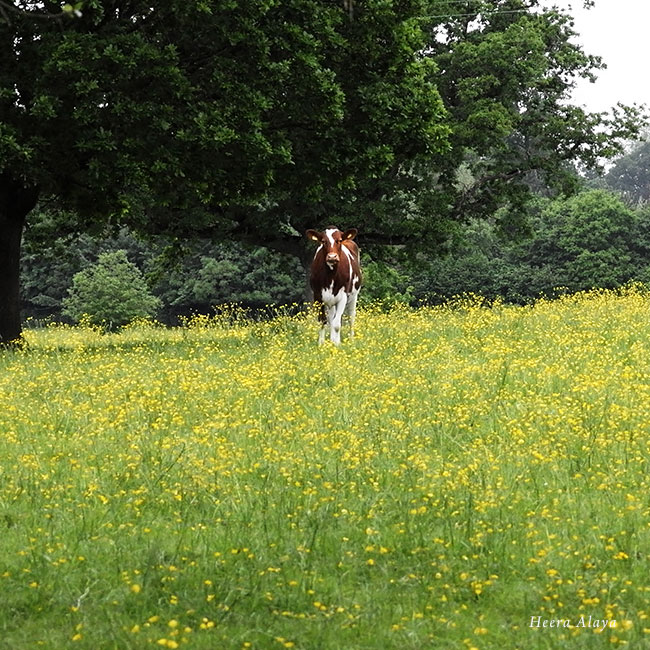
For me, the prettiest flowers—of the bovine variety—are Ayrshire’s—creamy white and bricky tan darlings. These fine-coat, spunky individuals, similar to wildflowers, cast their spell on me. Cows securely nurse their calves, adolescent cow friends jump for joy, and herd members strengthen their bonds allogrooming. “Hello, pom-poms,” a single call—one infused with tenderness, respect and affection—gets the attention of these brainy, curious beauties. Like the wind pushing through whispering trees, these sensitive sentient beings push through bobbing bright buttercups, harmoniously assembling for a photograph. I could stay affixed in this moment. Being in the rural idyll—soaking in flora and fauna, appreciating meadows adorned with visually opposing but also beautifully connected palettes, shapes, sizes and textures—elicits an indescribable feeling.
The world of flushed greens, different-pitched songs, gushing streams, and loving animals (with generous interruptions in the form of fledgeling birds and jumping crickets) offers a safe space to dive inward. The quest for understanding oneself is similar to comprehending the functioning of nature, which is influenced by variable environmental factors, such as rainfall, sunlight, wind, soil, temperature, and pollinators.
Water, for instance, is the main constituent of cell sap and essential for photosynthesis. Rainfall is the principal water source for trees and plants growing in the open, and the soil absorbs a substantial amount; however, a considerable amount is lost via evaporation and runoff. So, introducing crawling plants—that function similarly to mulch—reduces evaporation. Where sunlight’s energy galvanises plant growth, wind plays a crucial role in preventing a stagnant atmosphere and pollination. Conversely, heavy winds destroy plants and trees, making the top growth unbalanced. When I spot a one-sided tree, I know who’s responsible!
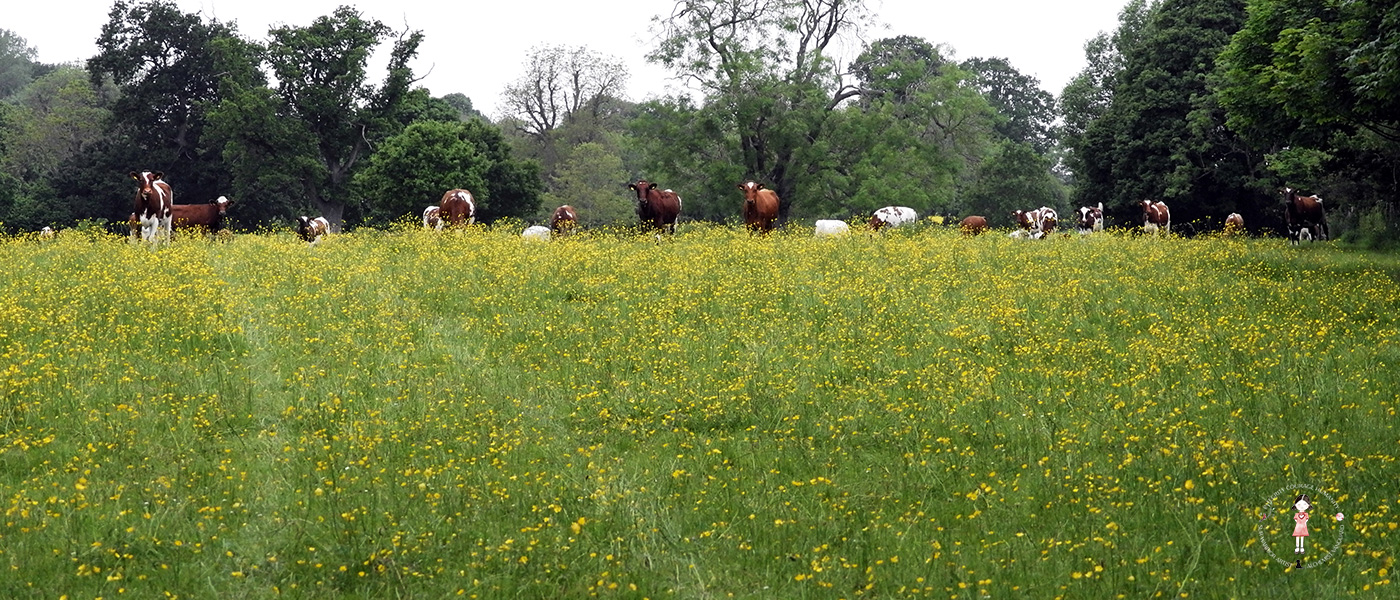
“I stopped eating meat some 50 years ago
when I looked at the pork chop on my plate and thought:
this represents fear, pain, death.”
JANE GOODALL
British primatologist and anthropologist
WRIGGLE. JIGGLE. WIGGLE.
The news of five precious grey bundles is quickly circulating, and excitement infuses the air.
“Arf, arf, arf.”
High spirits intact, our pace fastens through the lush fields toward the canopied stream.
“I can’t wait to dash and splash into the stream with my new playmates.”
Nipping his hopes in the bud: “I am afraid your dashes and splashes have to remain confined to your inflatable pool.”
HALT.
Stunned at the refusal: “Huh?”
“You heard right.”
“Just a little dippy dip. I promised my right paw a plunge in the stream.”
Talk about imagination! I shake my head in refusal.
FLOP.
Oliver throws me an irresistibly cute glance as he stretches on his back, twisting from side to side, tail furiously sweeping the grassy floor.
Holding Oliver’s leash close, “Nope”, I emphasise.
Tough luck, human. I am amping up my cute-o-meter. You will bend any second. Rolling back on his fours, Oliver shifts from one furry paw to the other, his wag thumping the ground, his petitioning saucer eyes blinking ever so gently.
My rational side warns: don’t turn into mush. Remain resolute.
Oliver pleads, “The stream looks so inviting. Just a few splashes in the cool water, puh-leeze.”
I don’t answer.
The arching fluffy eyebrows and twitching handsome moustache are at work: what could be on her mind?
“I can leap into the stream only three times. Three’s a good number.” Oliver is building his case. “The story you were reading to me mentions the three-leaf clover as a symbol of love, faith, and hope. Ooh, how I love three!” Oliver is leaving no stone unturned.
I am standing my ground (despite the warning of a germinating laugh storm).
Oliver whimpers. “I can settle for two dash-a-splashes.”
“N.O.”
“One jump?” There go the gooey eyes again. “The Mama swan is a fairy to my eyes; she is so booooootiful.”
I know better than to cave into negotiations. Kneeling, “It can’t always be about what we want.”
Oliver’s enthusiasm is palpable. “But we are out on our woodland walk. I have to investigate all the smells. I need to chase squirrels.” Unable to contain himself, Oliver blurts: “I want to dash into the stream; I am excited to see the new fluffy munchkins.”
“I understand your desire, but we must respect individual territories. Ukiyo gets stressed by the encroachment of her space. It would be unfair to put Ukiyo into a defensive mode—she is fiercely protective of her nest and young ones, rightly so.”
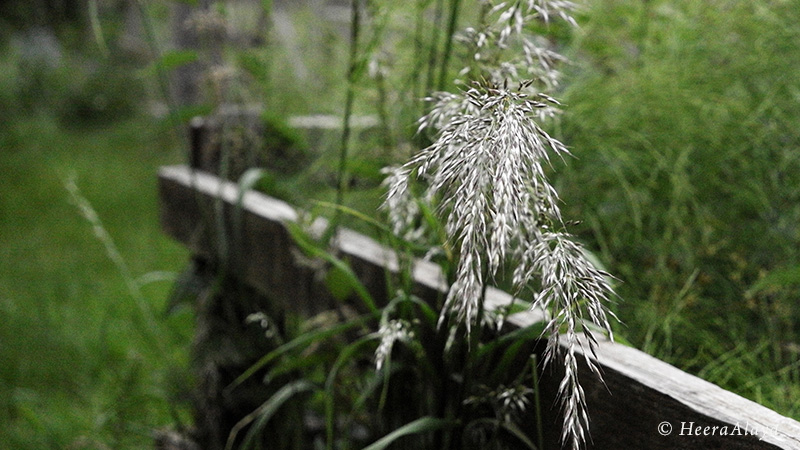
“But Mama Ukiyo always looks secure and serene.”
“And how unfair is it to assume we are entitled to consume Mama Ukiyo’s beauty and tranquillity but, in return, only cause her turmoil and pain?”
Oliver recalls his ear cap-wearing friend Lily, who was crying in pain due to a serrated ear (from the previous year). Lily insisted on playing with the fluffy’s, which agitated Mama Ukiyo. Lily ignored Mama Ukiyo’s repeated warning hisses. Having had enough of Lily’s rude and disrespectful behaviour, Mama Ukiyo opened her scissor-like beak and sliced through Lily’s ear: snippety snap, snippety snap, snippety snap.
“Woof. Woof. Woof.” Oliver’s stubbornness dissipates. “I want Ukiyo to be as peaceful on the inside as she appears outside.”
“I am proud of you. Everyone has the right to be content and safe in their inhabitation.”
NOSE BOOP.
We agree on being mindful of others’ spaces, and we settle in to quietly watch Ukiyo and her cygnets on their journey of exploring, engaging, and becoming.
Shimmering dust particles glide in light streams to announce the awaited arrival. The Anatidae family emerges gracefully from the shadows into light, which speaks to nature’s spellbinding infiniteness and choreography. The fluffy, greige cygnets float close to the majestic orange-billed, white-plumage mute swan gliding through a meandering tributary rich in submerged vegetation.
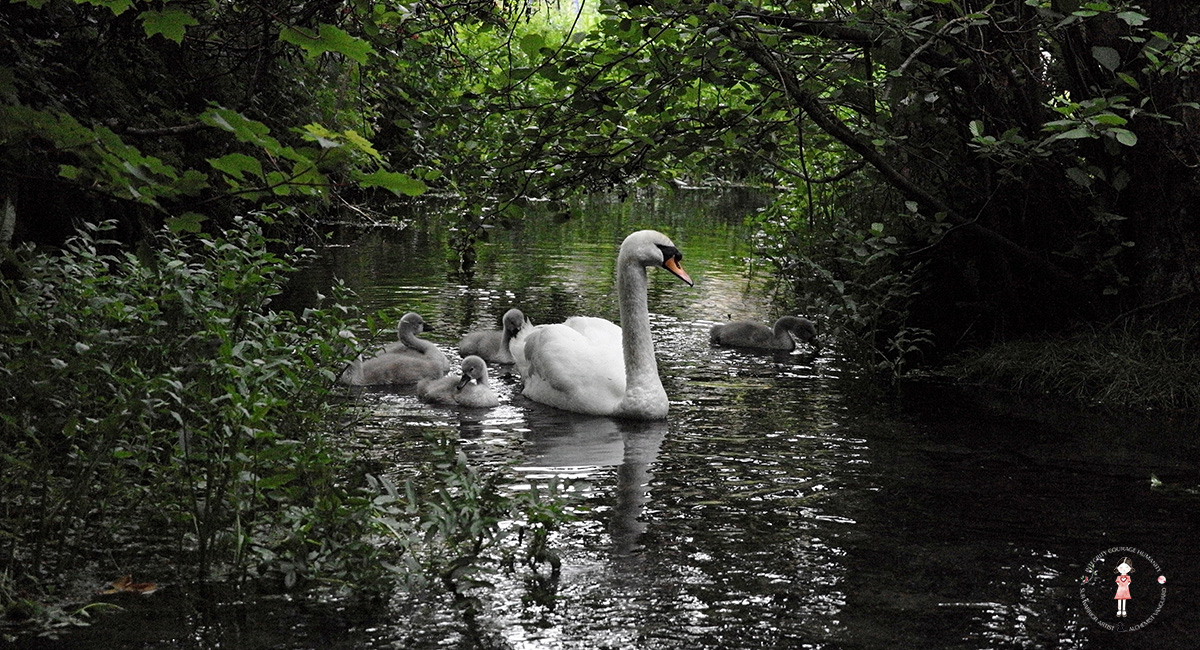
“Those who contemplate the beauty of the earth
find reserves of strength that will endure as long as life lasts.
There is something infinitely healing in the repeated refrains of nature –
the assurance that dawn comes after night, and spring after winter.”
RACHEL LOUISE CARSON
American conservationist
Oliver huddles close to me, marvelling at the cygnet’s movements: “The ripples are delicate.”
“They are lovely! The fluffy’s have tiny webbed feet that enable them to paddle gently and swim efficiently with their Mama.”
Transfixed in awe, Oliver and I sit on the damp grass, savouring the serene setting and the Anatidae family’s magical presence.
“What are the fluffy’s doing?”
“The cygnets are preening; it’s their natural way of keeping clean and maintaining plumage health.”
The greige fluff balls curiously scan their environment, swimming almost synchronously. They don’t steer far from their mother, quickly paddling back. When tired, hopping on their mother’s back for a ride—their very own regal Venetian gondola.
Oliver’s body trembles, watching the pen and her cygnets pay attention to the little creatures.
“Are they friends with the bee and the snail?” Oliver asked, disappointed at not being chosen as a friend.
“They aren’t friends. Ukiyo is schooling her cygnets.”
“About what?”
“Ukiyo is preparing her energetic fluff balls for life, introducing them to forms and creatures. By drawing her fluff ball’s attention to these diminutive bumble bees, snails and frogs, Ukiyo is putting life’s journey into perspective.”
“Huh?”
“By observing these tiny souls, the fluff balls learn never to put themselves below other creatures, be authentically spirited and move at their own pace,” I further elucidate.
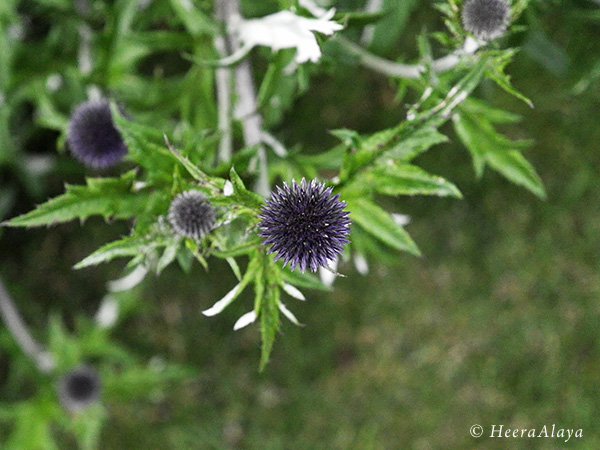
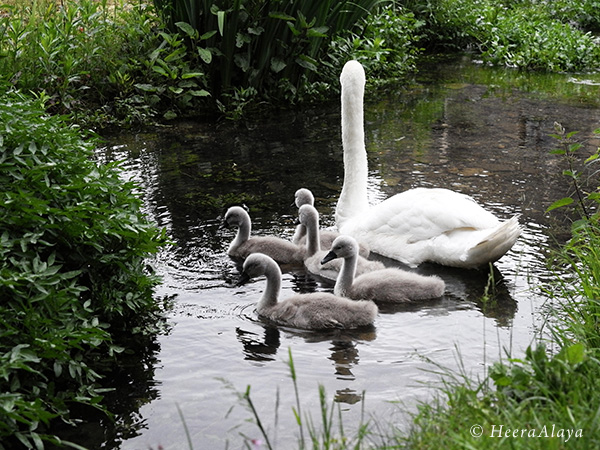
Oliver is introspecting, “My small soul is special, too. Do you think Ukiyo will bring her fluffy’s to me?”
“Anything is possible. What lessons will the greige fluff balls learn from your soul?”
Oliver shuffles in anticipation. “How to be cheerful, thankful and peaceful. My bright soul is like a meadow dancing with radiant flowers named awe, joy and grit.”
Oliver’s sentiments touch me. “Mama Ukiyo’s mind is as sharp as her scissor-like beak; I am sure she’s got wind of your soul. It’s a matter of time before she brings her fluff balls around to learn from your precious soul.”
The thumping tail and shifting paws exhibit Oliver’s elation.
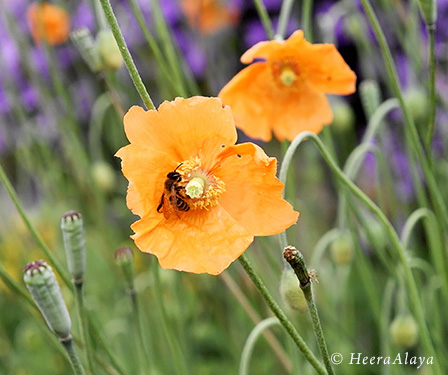
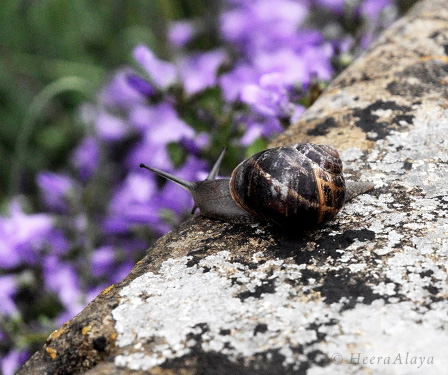
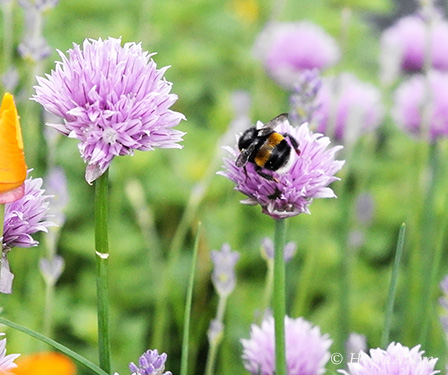
Putting his ongoing observations to work, Oliver suggests: “Mama Ukiyo must also be teaching her fluffy’s: When the going gets tough, be like the resilient snails carrying their heavy shell. And like snails, engage in undisturbed sleep, tucking your head under your wing, but always be vigilant. The other lessons might involve honey bees and bumble bees—be fierce like the former and industrious like the latter.”
“Well done, Oliver,” I cheer.
“The fluffy’s have to learn a lot.”
“That’s correct. And the fluff balls have to learn fast. Within a few months, the cygnets will transform—one feather at a time—going from delicate greige fluffy babies to strong white adult swans, bringing their playfulness and free back rides to an end and forcing them to take on adult responsibilities.”
Birds chirp, squirrels kuk, bees buzz, frogs croak, and crickets click, dispensing a unique background score as Oliver and I savour the serenity of the ethereal palette.
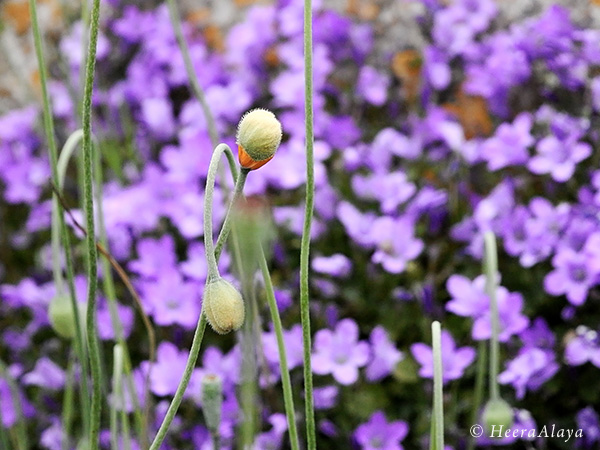
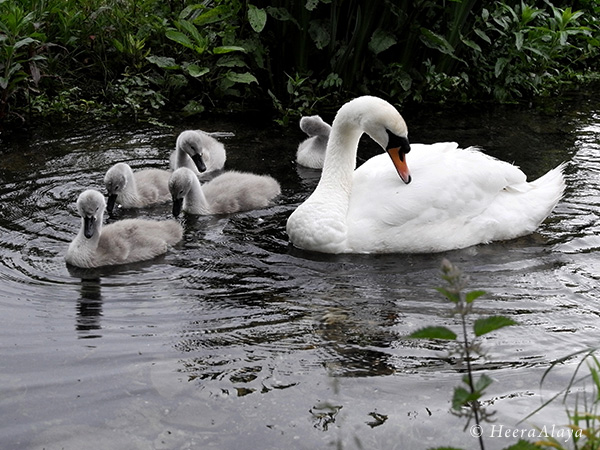
I quietly observe nature’s interconnectedness and idiosyncratic colours.
The poppy seed’s curvature mimics the S-shaped neck of the mute swan whose orange bill reminds me of saffron, a short-period, autumn-blooming beauty, which is intense lavender, a permutation of purple. These tingled-with-blackness purple-veined Crocus sativus flowers have scarlet stigmas—pollen-receptive portions of the female pistils—the highly valued spice, saffron. So delicate are these Crocus sativus flowers—requiring warm nights and well-drained soil—they must be entirely hand-picked.
Just as I mull on mauve, another variant of purple, I sense a slight movement close to my ear. “The mauve you are thinking of gets its name from the mallow plant, which blooms in a similar hue,” the spirit of the late William Henry Perkin whispers his findings. I turn to ask the London chemist about Empress Eugénie de Montijo’s (1826-1920) preferences: “Had she been alive, would she pick delicate mauve as one of her favourite colours, or would she choose a bold shade closer to the mute swan’s orange-bill?”
WHOOSH.
I was a tad late—Perkin had floated to other discoveries!
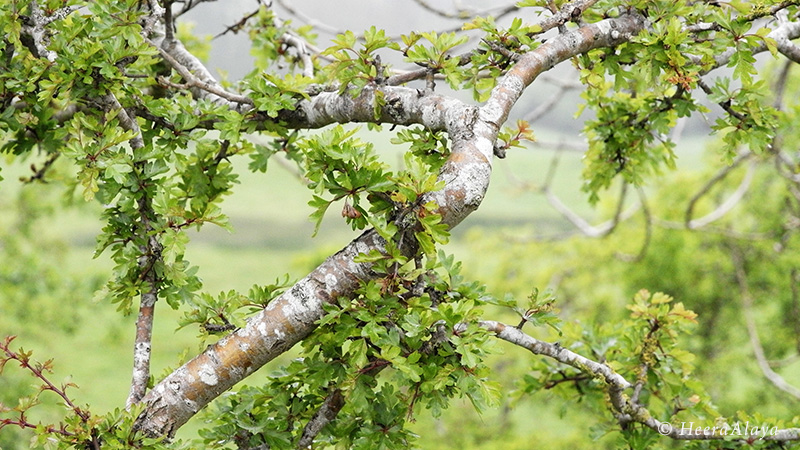
“The way animals are carted around
reminds me of the slavery of my people…
The slavery of animals has to be ended too.”
BENJAMIN ZEPHANIAH
British writer
SHUDDER. SHUDDER.
A gust of wind engulfs me with a pungent, foul stench—a concoction of aquatic odour, decaying wood and rotting carcass. This dismal reality of death is a reminder of life’s inevitable circle—birth, living and death.
My pace fastens past the stream. And I am compelled to contemplate: Did the fauna live to its full potential? Was the flora aware of its enriching legacy? Was the fauna’s physical death a result of territorial aggression or parental infanticide? Did the flora die naturally or result from human avariciousness and inhumanity? Were the fauna and flora aware of their innocence, capacity, strength, resilience, beauty and compassion? No matter the answer, I am in permanent awe of flora and fauna who live courageously in alignment with their innate identities and behaviours, weathering the storms of life and travelling light through the journey. On the other hand, I can’t understand humans who, thanks to being ashamed of their identity and capacity, self-shackle to manipulation, deception, and corruption. And I fail to wrap my mind around those with inherent destitution, who, despite acquiring shiny trinkets, remain with clipped wings and cowardice in their gilded cages, ensuring they exist through a lifetime of decomposing and decaying; they are dead before they die.
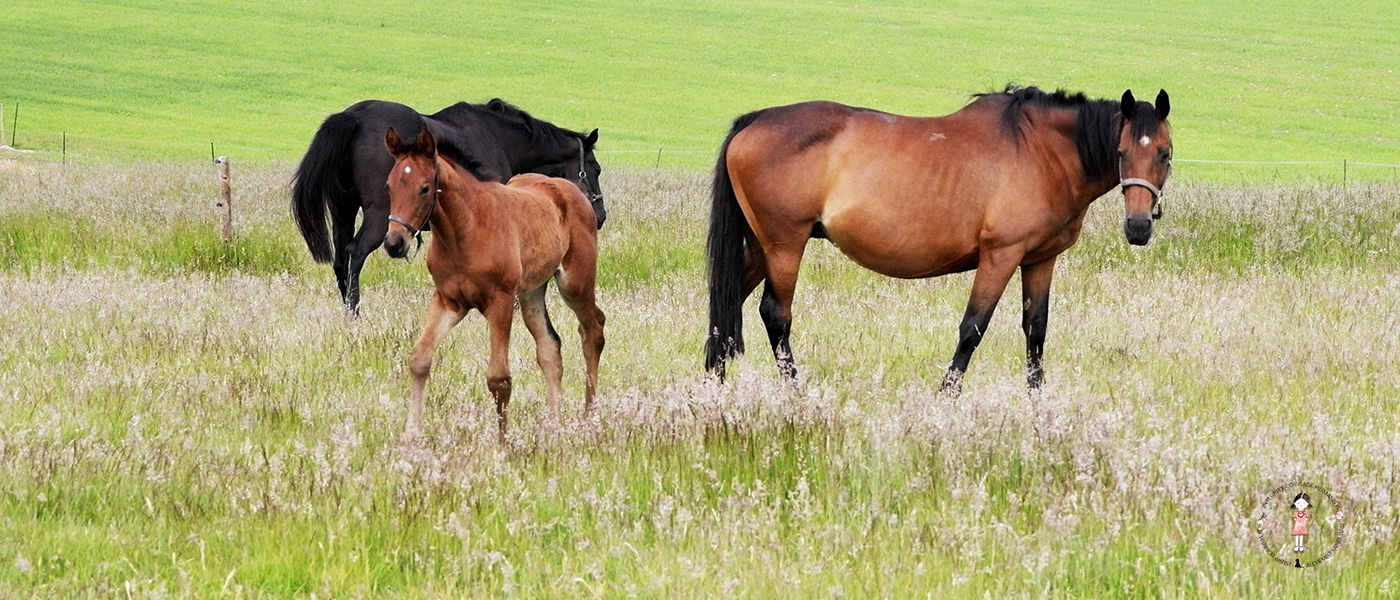
The wind reads my mind, dispatching a crisp breeze with the instruction: “Ensure she doesn’t get caught up in morbid thoughts.” The floating aromatic smell blends fresh vegetation and grassy-hay horse dung.
“Oh, there you are. I was expecting you at the end of the field.” I call out to the equine family, ambling along each other in silence.
The protector stallion retracts his upper lip, sniffing: “It’s our human.” Pleased with my calm and trusting demeanour, Peppercorn greets me with neighs. “Aaaa-he-he-hurrr. Aaaa-he-he-hurrr.”
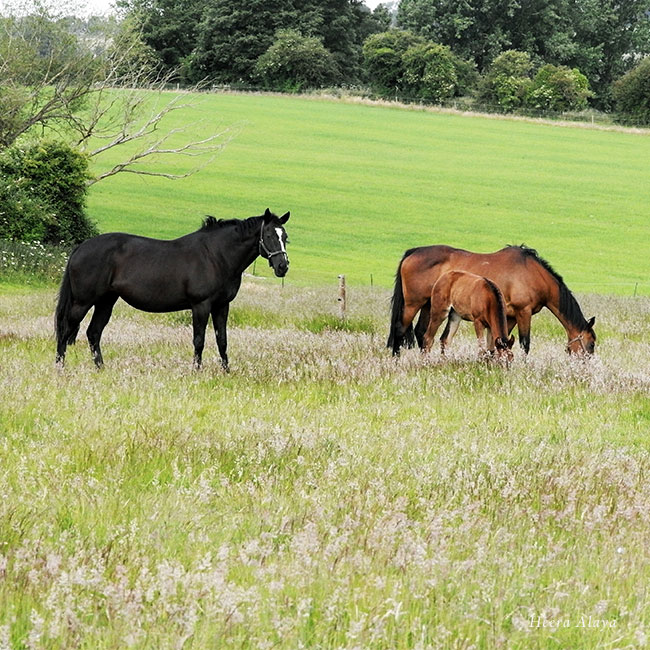
“Cinnamon is picky about grazing and foraging quality grass with high roughage content and insists Nutmeg gets strong on the right diet of grass and herbs,” offered Peppercorn, referring to the female mare and their colt. “I have to keep myself in check—if I trot into greedy guss territory—consuming too much rich grass, my non-structural carbohydrate [NSC] shoots up, prompting laminitis, swelling feet, tenderness, and inability to walk.”
“You are doing a great job of reigning over your tongue,” I praise the shiny, strong stallion.”
Aaaa-he-he-hurrr.” Snorting, “We are heading up towards the hill—to show Nutmeg the bluebells.”
“Stunning. It’s just stunning,” I exclaim at the thought of the woodland floor carpeted with bluebells. “Nutmeg will appreciate the atmosphere.”
The cool, crisp wind blows the nearby sounds—whining, clip-clops and munching—enriching the spring atmosphere. Cinnamon lifts her lowered head, staring at me with her deep equine eyes, imparting philosophical sentiments: “You are one with us, living beside us.”
“I so appreciate your inclusiveness, Cinnamon.” I feel grounded in the realisation that I am just another organism, one among millions.
“Go on, play with her,” Cinnamon directs her curious colt, who remains close to his decision-making dam, nursing, kicking and exploring. An unsteady newborn, Nutmeg said hello to the world at dawn after an equine gestation of over eleven months.”
“Nutmeg is blossoming into a refined-featured, slender-legged galloping colt,” I compliment Cinnamon.
“Uoo-oo-oo. Me-he-her,” Cinnamon let out a proud, vibrating whinny. “Nutmeg has taken after me, starting from his coat colour.”
The graceful, white sock-marked baby Nutmeg takes long strides toward me. Today, unlike yesterday—when he wanted to nuzzle me, his body language permits me to stroke his soft mane. There’s no ambiguity—Nutmeg is aware of healthy boundaries and strength in calmness.
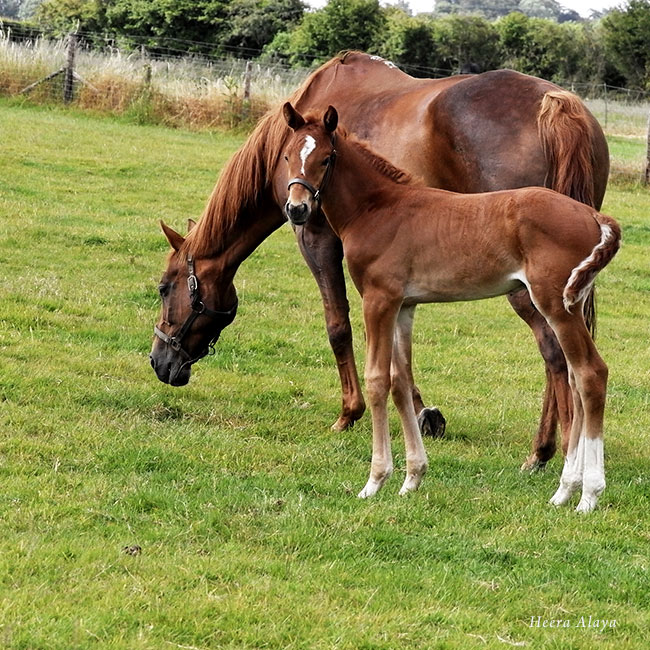
Chirrup. Chirrup. Chirrup.
A faint rustle, indicating a movement in the tall grass, catches my attention. Not detecting any creature, I conclude it to be a grasshopper playing hide and seek. I do a double-take. What an unusual intricate curl. Wait a minute, why does the unfurling fern appear more like a cat’s tail???
The tail that came to rest horizontally gets the zoomies—swishing, flickering, twitching. Soon, a backward crawling body emerges from under scrubby vegetation, mouth chattering and whiskers quivering. The taupe and grey tabby sits up, appearing bloom-like, flanked by wildflowers and wild berries. “Did you see that?”
“See what?”
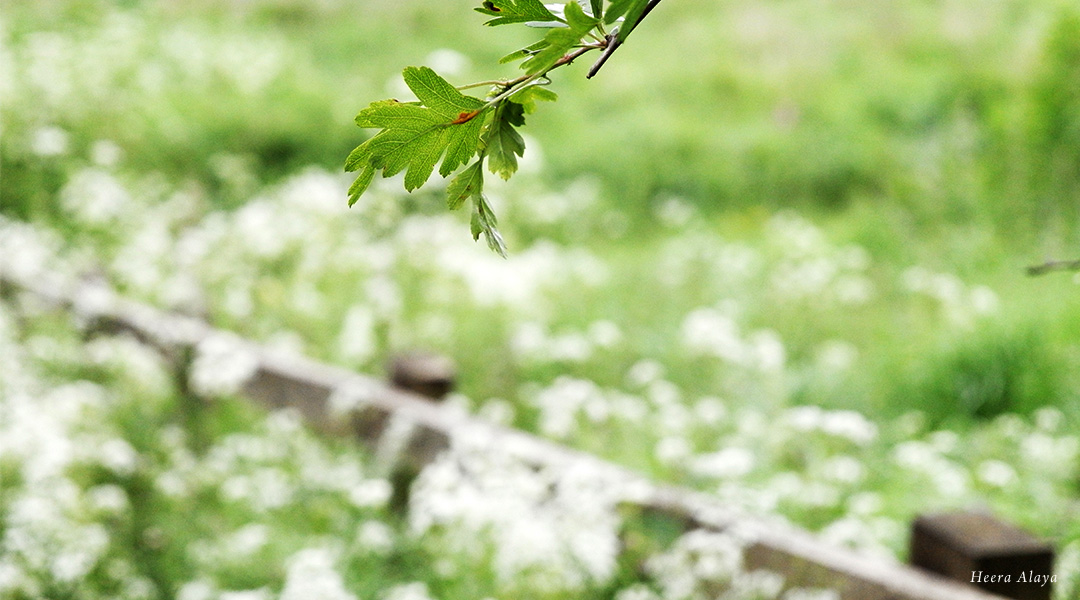
With his primal instincts in full force, the tabby pounces high in the air and lands just as elegantly. More dramatic pauses and guttural vocalisations follow the aerial pirouette.
“Wraww. Wraww.”
I struggle to keep up with the Duke of Dandy’s dramatic vocal changes and impulsive-quick-switching behaviours.
“It’s right here. How could you miss it?” asks the Duke of Dandy, meowing, referring to the unseen machinery behind the natural world.
“Miss what?” Suddenly, I feel not as bright as the Duke of Dandy, who can immerse in the marvels of the world in a way beyond my comprehension. With his sophisticated wiring—righting reflex to olfactory and sensory systems, the Duke of Dandy is configured to perceive the world differently.
“Meorw. Meorw. Meorw.” The tabby looks into my eyes, taupe ears upright and coral-hued nose crinkled.
“Did the Duke of Dandy encounter a flitting Duke of Burgundy or perhaps a skipping woodland fairy?” I ask the tabby, hopeful of a fascinating introduction.
“Wwawn.”
Comm’on, Duke, please tell me what you are seeing and experiencing. Clearly, I can’t see what Your Highness does.” I surrender.
The Duke of Dandy’s sixth sense discerns my ineptitude. The tabby generously rubs on me, encouraging me to rake my fingers through his plush coat. He comforts me with the rhythmic beat of his purring: “MURRRHHHHH.”
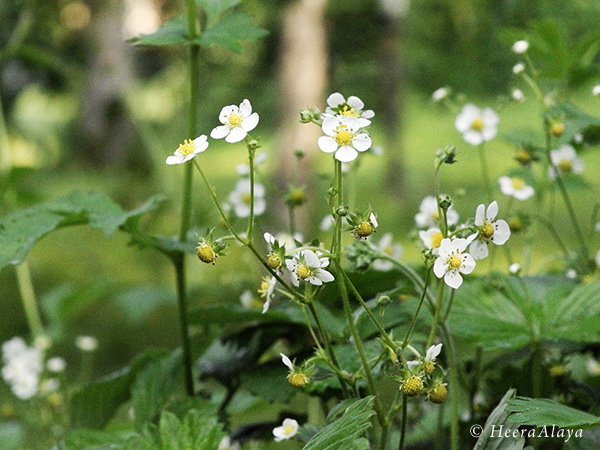
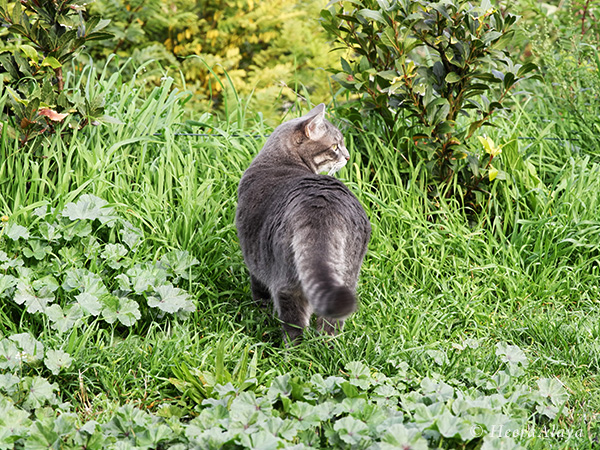
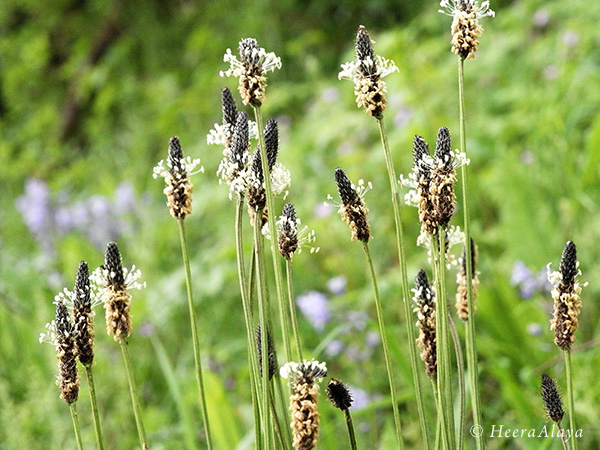
A delicate wrought iron seat, nestled in the meadows, calls my name: “Come on over, sink in. And yes, yank off your shoes.”
Thanking the tasteful, well-positioned bench for the generous offer and the brilliant suggestion, I slip into the sunken seat and tug at my wellies, tossing them: ”Off you go, fellas.” KER-THUD. THUMP. My thick socks follow suit.
“Ahh, this is heaven,” I declare, oohing and aahing, closing my eyes as my feet press the dewy grass. “And don’t you go burrowing into the damp, soft earth,” I warn my feet, not wanting to rouse the wild rabbits!
“MAW?”
It’s the Duke of Dandy’s turn to get confused by me—I am operating on different levels. My feet are in a luxurious, dewy world, my body has declared rest, my eyes continue to feast, my mind laps up sensory information and my soul blossoms.
Pillowed in fresh greens and hushed sounds, I sit in quiet contemplation, sifting through my accumulated forage (experiences, feelings, observations, emotions and learnings) and relishing the glorious meadow—the swaying tall grass, the murmuring tractors, the glittering-dancing particles, the floating fresh grass and smokey wind. This moment of living is bliss.
I lay on the carpeted grass, my feet perched on the sunken bench, watching the drifting fluffy white clouds counting: “One, two, three …. Hey, where did the fourth cloud go …? And here comes the fifth …. I guess not. Oh, there you are. C’mon, you can do it,” I egg on the shy cloud, “Don’t hide.”
Perched on my chest, kneading my claw-punctured flannel shirt, “Clouds don’t hide,” schools the tabby.
Talk about not concealing—the Duke of Dandy—with his directness—must have Dutch blood.
“Wwawn. “The atmospheric conditions are changing,” declares the tabby, quickly distracted by the birds flying at treetop heights.
A sudden darkening sky veils the transforming fluffy clouds. And then, through dark clouds, a glint of light flashes across my face. I lay transfixed by the bewitching sight, questing: “Could this well-lit, mystical pathway be a pull to heaven? Reality springs to mind: Life’s passing by. My hand instinctively moves to my chest: I am breathing, feeling, and alive.
I am pressed to delve into my journey; my mind swirls with questions: Did I breathe courage into my soul? Did I remain steadfastly high-principled? Did I live with contentment? Did I pivot my values to my authenticity? Did I think independently? Did I learn expansively and execute my knowledge effectively? Did I love honestly? Did I sprinkle kindness and generosity? Did I dive into joy? Did I capture the light and battle with might? Did I barricade myself from those infected with ills? Did I openly appreciate and encourage? Did I take risks? Did I flush quality nutrients into my cells? Did I conquer swimming at the deep end? Did I express gratitude? Did I honour my individualism and conscience? Did I remain childlike? Did I hurt, cry, grieve and then some more? Did I prioritise solitude, boketto and tranquillity? Did I remain progressive? Did I unapologetically own my scarred journey? Did I foster my rich inner world? Did I live as a whole? Did I stay delicately tenacious and purposefully audacious? Did I bloom gloriously?
The light suddenly disappears. “Whew! That was deep.”
I suddenly feel light, like a weight has lifted off of me. And it has—the Duke of Dandy has disembarked his marked territory.
PLOP.
That figures. The tabby’s heightened sense informed him of upcoming rain showers, starting with the low-flying birds.
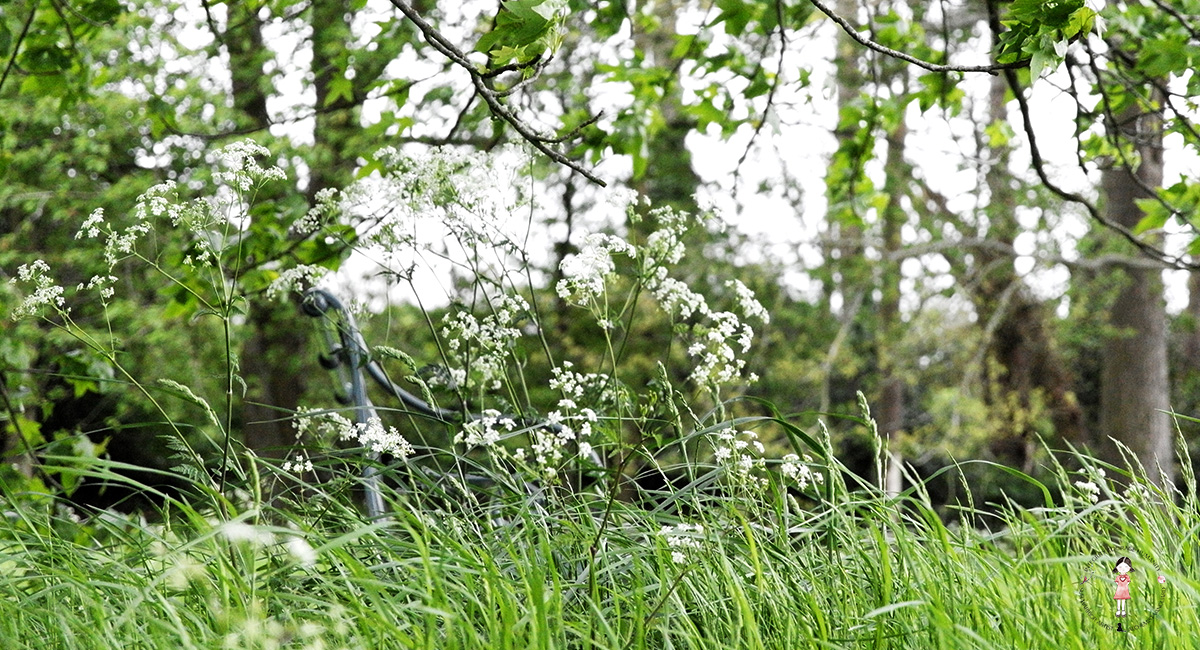
“Let us be silent—
so we may hear the whisper of the gods.”
RALPH WALDO EMERSON
American poet and philosopher
A storm cloud rumbles.
PLINK. PLATTER. PLONK.
The downpour douses me. With my back resting on the wrought iron bench, legs stretched out, and face thrown back, I delight in every chilly drop of cleansing, renewal, and transformation. “Mmmmm, hum hum.”
“Scooch over,” instructs a deep, authoritative voice to my left.
“Whoa!” I spin to face the voice. My jaw drops open, and my drenched body slides, making room for another back to rest on the garden bench.
“Enjoying the simplicity of nature and self-reflecting, huh?” Socrates inquires casually, admiring the vista, twiddling his bare feet.
“To borrow your sentiments: “The unexamined life is not worth living,” I answer, maintaining composure.
“We concluded as much.”
I am baffled.” WE!! Did you say WE? Who are WE?”
“Plato and Aristotle,” offers Socrates, adding, “We have been with you through your entire journey.”
Feeling self-conscious, I seek clarification:” What’s the purpose of trailing me? There is something called privacy—”
“Oh, well—”
My head swivels to face the voice in front of me. It’s Plato!!!
Engrossed with taking notes on his invisible papyrus, Plato glances up momentarily, “We pick our tribe and keep them close.”
“I am honoured. But—”
“Ho ho,” Aristotle chuckles, walking into the frame and offering Socrates juicy berries, “We set up hurdles for you—”
“Hurdles?” I quiz.
“You bet,” adds Plato, placing his indiscernible reed pen on the soppy meadow floor. “We set up the maze to test you for ethics, morals and justice.”
“Are you kidding me? To say your tests, over a lifetime, were unsparing is an understatement. Why would you put me through inconceivable distress?” I demand answers.
“The pulp-to-skin ratio is just right,” Socrates praises the wild berries, “it takes bright sunlight and fitting soil to bring out the berries unique flavour profile.” Turning to me, Socrates continues, “Child, when we learn of a bright soul with a profoundly feeling heart and a clean mind, we put into motion our recruit program—to embrace into our circle. And since an honoured life pivots around virtues and principles, we put the chosen soul through a series of tests—from strength of character to moral courage and unwavering integrity.”
“We also had obstacles to evaluate your curiosity, imagination and creativity,” Aristotle builds on Socrates explanation.
“Woohoo!! How exciting.” I am miffed.
“Plato, do you sense sarcasm in the air?” banters Aristotle, adding, “I have just received news that an innocent, gentle lamb has finally turned into a wise, powerful bee.”
“Haha. Hee hee. Hoooo ho.” Plato and Aristotle laugh in concert.
Noticing my displeasure, Socrates brings back focus to the program, “Enough of being wisecracks.” He then instructs Plato to check his notes, “Are we missing any crucial points?”
Aristotle hums while Plato diligently studies his notes.
“Chapter 4 …. innocence …. uhm, uhm, uh, dreams and sudden detour …. uh-huh … chapter 26 traitor, and, where is it …here it is, bedlam …. next uhm, um.” Looking up, “We covered the ABCs of strengthening tenacity and resilience—abandonment to betrayal and character assassination to test her authority, bravery and capacity. Turning to address me: “You surprised us with your harmony and honesty, too.”
“Really,” I retort like a cornered badger, “What’s the point? Despite these qualities, people not only attacked and assaulted me, but they also turned their backs on me?”
“That’s to be expected. Your honesty and integrity expose unpleasant realities and threaten people’s self-image. Remember, no one is more hated than one who speaks the truth,” Plato states, adding: “The real work is going to begin—”
“Ahem, ahem,” Socrates clears his throat rather loudly.
I am suspicious. “Something I should know?”
“Oops, never mind,” Plato quickly zips his lips.
My head collapses into my hands. It’s spinning at the thought of enduring the trio’s program. “Obstacles, upheaval, punishments … ARRRGHHH. I want to run away from your three,” I declare, moving forward to dash.
Socrates grabs my hand firmly, instructing Aristotle: “Please announce her test results.”
“High time.” I snap impatiently.
“Your wish is my command, Socrates.” After a dramatic pause, Aristotle beamingly announces, “Dear Bee, oops … our dearest friend, we are over the moon to inform you that your soul passed with flying colours.”
“Phew,” I heave a sigh of relief amid the hurrahs. “What’s my reward?”
“It’s always a good idea to start a celebration with juicy wild berries,” Aristotle says, tossing a generous bunch of berries for me to catch. His palm accidentally reveals a deep stain, making me look down at mine—they are coloured by the bursting berries oozing with flavonoids.
My mind is on overdrive.
“WILD NATURAL DYES,” I announce, springing up from the grass, sploshing and splashing the puddles left behind by the thunderstorm.
The teacher-student trio remains poised and at home on the wet grass, knowing I benefit from philosophical osmosis. “Go on, share your imagination,” they encourage in unison.
My cheeks insist on touching my lit-up eyes. Recollecting Honey Crisp’s words on “gentler ways to colour wool“, I draw attention to my bluey-pinky-purpley pigmented palms. “Remember the wool scarf I am going to knit with Honey Crisp? Well, I have to forage for the right berries, mushrooms, barks, moss …,” I express animatedly, “to make natural dyes for the wool. Willow can help me dye the wool in the palest of hues—buttery pollen, hazy green, frothy grey, dusty pink…. “Oh, Honey Crisp will be so proud of me.”
I twirl at the thought of knitting a scarf layered with centuries of evolution, restoration, and continuation and throw myself on the sodden meadow floor, drinking in the natural world with awe and joy: “The beautifully crafted complex network of flora and fauna is the elixir of soul flourishing …” I trail off. The trio’s voices and nature sounds are increasingly muffled.
“Mureow. Maw.”
“Baaaaaa.”
“Wruof. “Arf. Woof.”
“Aaaa-he-he-hurrr.”
“Hey, you.”
An array of faces hover around mine, waking me up. The swift wind slithers through the grassy hills, shaking the glistening wet leaves and wildflowers.
“Aperire, aperire …,” a feathery friend’s song pipes down a tree, celebrating the openness of spring.
CHIRP. HOOT. TWEET.
Heera Alaya
Animal aficionado. Dendrophile. Progressive pantheist.
